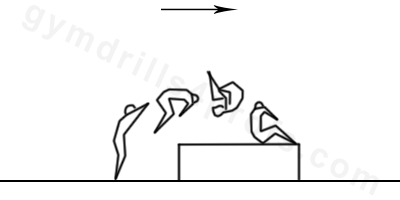


A front tuck flip is usually performed after a modest run. The last step of the run should be the hurdle. During the hurdle, the arms should be doing a circle sideways, from downward to upward. The arms should finish over the shoulders. The head should be in a neutral position with the body extended, slightly arched, with the hips forward. The gymnast should jump from their toes, with their feet together. During the flight (until vertical), the gymnast should regroup their body. The legs should be bent and moving backward, at the same time the upper body and the arms should be following the legs. The gymnast may hold their legs, but this is optional. From the vertical position (at the highest point in the flip), the body should begin extending and preparing for the landing. The head should be in a neutral position. At the landing, the arms should be bent in front of the chest.

The gymnast should start in a standing position. They should squat down and place their hands on the floor. As they do this, they should tuck their head down, and perform the forward roll. Their back should roll onto the floor smoothly from the neck to their buttocks. They should finish the skill in a squat position and immediately extend their legs to a stand.

To perform a dive roll, the gymnast should run, gradually increasing their speed. They should punch off the floor with their legs tight and feet together. They should jump into the air with a straight body. At the moment of the punch, the gymnast’s arms should do a back circle and swing upwards. This arm motion will help to increase the height of the jump. After the jump, the gymnast should arch their body slightly while kicking their legs backward. They should keep their chin up with their arms slightly bent out to the side. The kick from the gymnast’s heels will help to flip them forwards. When the gymnast reaches the floor, they should be in a nearly vertical position. They should bend their arms slightly, roll forward and stand up.

This drill should be performed from standing. The gymnast stands at the edge of the floor. The drill starts with raised arms. Then the athlete jumps forward into the pit, kicking backward with bent legs. The bent arms should lower and follow the legs. For the first few attempts, the gymnast could finish in a seated position, instead of standing. With experience, the rotation in the flight should be faster and the initial jump should be higher. The final goal is for the gymnast to land on their feet in the pit.

The front flip is easier to perform on the trampoline. Use the added bounce to create a higher jump. The gymnast should jump at the center of the trampoline. The front flip should start and end on the cross.

There are several ways to spot the gymnast during a front tuck. One hand could be on the belly, with the other one on the back of the athlete. In this case, the gymnast should be rotating around the hand which is on their stomach. The alternative method is for the coach to place both hands under the gymnast’s back.

The scope of this drill is similar to a front tuck obstacle drill. By performing the front tuck onto an elevated surface like a ResiMat, it encourages the gymnast to jump upward with a straight body in order to have enough height. The gymnast should finish this drill in a seated position on the ResiMat. It’s important for the gymnast to keep their knees apart (but feet together) during this drill to avoid bumping into them on the landing.
Integral part of gymnastics coaching process are skill drills. They help gymnasts to learn easier and technically correct. With GYM DRILL PRO you will find variety of ideas for the most the basic gymnastics skills. There are plenty of images with skill drill progressions. It is intended to support explicitly the qualified coaches in their daily coaching business. DO NOT practice without the guidance of proper professionals.